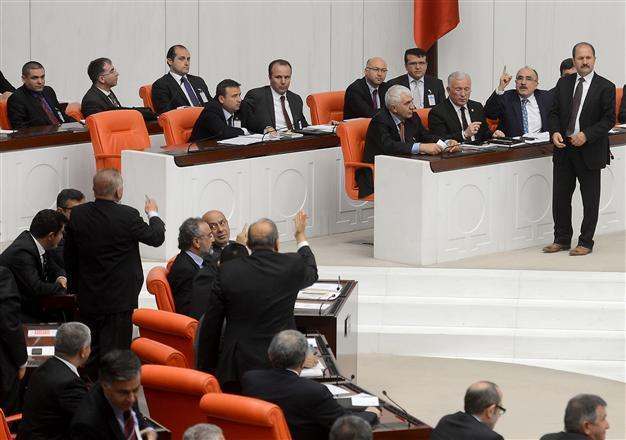Opposition: New intel law reinforces coup legacy
ANKARA

The parliamentary debates on the law are marked by moments of tension. AA Photo
The Turkish government’s new intelligence bill will strengthen the authoritarian aspects of the legacy of the 1980 coup rather than usher in a period of greater freedom, the country’s opposition has warned amid growing fears that the administration is attempting to establish its own police state.
“What does this mean? That’s to say, we are granting [the National Intelligence Organization - MİT] the authority to kill,” said Republican People’s Party (CHP) leader Kemal Kılıçdaroğlu, setting the alarm bells ringing, as he recalled how the bill that was adopted by Parliament late April 17 granted the agency additional powers both inside and outside the country.
According to Interior Minister Efkan Ala, however, the bill is basically a democratization move.
“We are renewing and democratizing arrangements that are part of the coup regulations by discussing them at the Parliament. We are taking proper steps that befit Turkey,” Ala told reporters. “[The MİT Law] constitutes steps to increase the civilian authority’s effectiveness over public authorities and security units in a democratic way.”
But Nationalist Movement Party (MHP) Deputy Chair Şefkat Çetin argued that the MİT Law is actually designed to strengthen Prime Minister Recep Tayyip Erdoğan, not the state.
Parliament also adopted a proposal to found a security and intelligence commission which the government says will not act as an advisory board but as an auditing board.
Creating new hitmen?
“New ‘Yeşils’ will emerge. All kinds of weapons will be given and they will say, ‘Go, launch the operation,’” Kılıçdaroğlu said, referring to a fugitive operative codenamed “Yeşil” – also known as Mahmut Yıldırım. Yeşil has been on the run since 1996 and is suspected of being the culprit in dozens of unsolved murders. His whereabouts and whether he is dead or alive remain unknown.
Mehmet Eymür, a former senior leader of MİT, had previously told the Ankara Chief Prosecutor’s Office that Yeşil had worked for MİT and JİTEM, a clandestine gendarmerie intelligence unit whose existence has been officially denied.
In the past, MİT illegally blacklisted people, the CHP leader said, maintaining that the law would legalize such actions.
“With the arrangement, from now on, no investigation is secret for MİT. Why? Are these efforts to cover up the Dec. 17 operation? We will not allow this,” Kılıçdaroğlu said, referring to a huge graft probe involving figures from or close to the ruling Justice and Development Party (AKP) government which became public on Dec. 17, 2013.
Granting legitimacy to separatists at an international level?The bill, which requires presidential approval, would give MİT the ability to launch covert operations and widen access to the personal data of citizens. It would also introduce prison terms for the publication of secret documents.
It provides expanded scope for the spy agency to tap into private phone conversations and collect intelligence related to “terrorism, international crimes and external intelligence gathering.”
It also sets prison terms of up to 10 years for journalists and others who publish leaked information.
Also under the law, MİT agents who make contact with “terrorist” organizations as part of their job, including with the outlawed Kurdistan Workers’ Party (PKK), will be granted immunity.
According to Çetin, the bill “whitewashes and legalizes illegal meetings that the AKP government has held with the terrorist organization PKK.”
“The state’s recognition of a terrorist structure as counterpart could also mean granting the separatists the right to legitimacy at an international level,” Çetin said.
Earlier this year, MİT agents were stopped by Turkish police officers smuggling weapons into Syria, despite denials by Ankara that the government was aiding the rebels there.
The government insists the overhaul will make the agency more efficient.
Opposition parties say the bill grants the agency far-reaching powers that will turn Turkey into a surveillance state. It has vowed to seek its cancelation at Turkey’s highest court.
Deputy Prime Minister Beşir Atalay rejected accusations that the agency was being given extraordinary powers, insisting MİT would act within Turkish laws.
“We want to create an intelligence agency that suits a powerful state but which acts within the law,” he said.
The legislation is the latest step by Erdoğan to tighten his grip on state agencies as his government fights allegations of corruption. Erdoğan accuses followers of a U.S.-based cleric, Fethullah Gülen, of infiltrating Turkey’s police and judiciary and instigating the graft probe to discredit the government.
Since the corruption scandal emerged in December, the government has given the justice minister increased powers over the judiciary, tightened government controls over the Internet, shut down Twitter and YouTube and removed thousands of police officers and prosecutors from duty.
Turkey’s highest court has since overturned the Twitter ban and annulled the justice minister’s authority over the judiciary.
